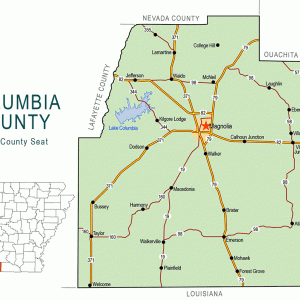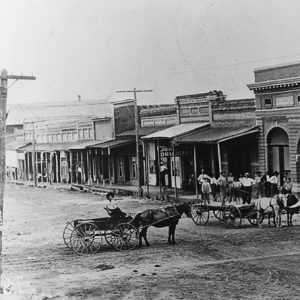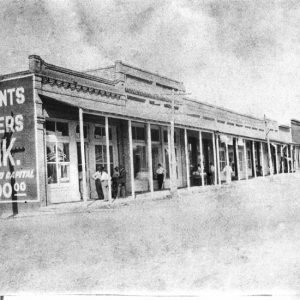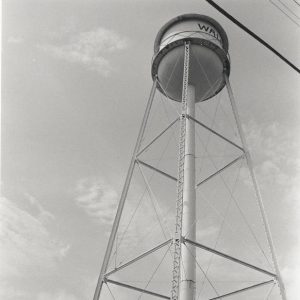calsfoundation@cals.org
Waldo (Columbia County)
| Latitude and Longitude: | 33º21’05″N 093º17’45″W |
| Elevation: | 361 feet |
| Area: | 2.19 square miles (2020 Census) |
| Population: | 1,151 (2020 Census) |
| Incorporation Date: | August 13, 1888 |
Historical Population as per the U.S. Census:
|
1810 |
1820 |
1830 |
1840 |
1850 |
1860 |
1870 |
1880 |
1890 |
1900 |
|
– |
– |
– |
– |
– |
– |
– |
– |
709 |
929 |
|
1910 |
1920 |
1930 |
1940 |
1950 |
1960 |
1970 |
1980 |
1990 |
2000 |
|
597 |
704 |
942 |
1,240 |
1,491 |
1,722 |
1,658 |
1,685 |
1,495 |
1,594 |
|
2010 |
2020 | ||||||||
|
1,372 |
1,151 |
Like many small cities throughout the state of Arkansas, Waldo (Columbia County) owes its existence to the construction of the railroad through the area in the 1880s. With a connection to the outside world, it soon became a thriving commercial area with as many as seven lumbering operations located in the immediate vicinity.
Waldo owes its founding and development to the construction of the St. Louis, Arkansas and Texas Railroad into the surrounding timberlands in 1883. At that time, Lamartine (Columbia County) was a thriving town in the area. But when the tracks were put down approximately three miles to the south, citizens began to move there, with businesses soon to follow. Once the Lamartine post office was relocated along the tracks, it soon became a regular stop. The railroad company purchased twenty-six acres of land south of the tracks, organizing a subsidiary known as the Southwestern Improvement Association. Local landowner and businessman Dave Dixon donated additional tracts on the north side of the tracks. The area was surveyed into ninety-six business lots with equal numbers on each side of the tracks. The survey also included 120 residential lots. The city was incorporated on August 13, 1888.
According to one story, the town was named in honor of Waldo Stephens, the surveyor for the Texas and St. Louis Railway Company in Missouri and Arkansas, which commonly came to be known as the Cotton Belt. Legend has it that Stephens (Ouachita County) was originally to be named Waldo, but an oversight by the map maker switched the names, giving the name Waldo to the present-day town fifteen miles south of Stephens in Columbia County. However, Wade Kitchens wrote a letter to the Banner-News claiming to have met the surveyor in question while serving in the Philippines during the Spanish-American War; the man claimed to have named the town of Stephens after himself while naming Waldo after the “General Freight Agent of one of the railroads in Dallas.”
While the business sector initially developed on the south side of the tracks, by 1890 it had also spread to the north. Caspar H. Pace opened the first general store and also served as the first postmaster. This enterprise was soon followed by others opened by W. Starling and W. O. Benton. Much of the city’s early growth was prompted by the opening of the Neimeyer Lumber Company in 1887, soon to be followed by other operations. At its peak in the 1890s, the area timberlands supported seven timber-based companies. These operations supplied employment, and by the turn of the century, the city supported almost 1,000 citizens—a little less than a third African American. By 1900, a spur line, the Waldo and Fort Smith Railway, was connected to the Neimeyer Lumber Company. The city, which was referred to as a “flourishing mill town,” quickly prospered.
The Bank of Waldo, the second-oldest bank in the county, opened in 1899 with a capital stock of $25,000. It was followed by the Peoples Bank in 1910. In 1891, C. J. Parker founded the Waldo Enterprise, the first of at least ten newspapers to be published in the city over the years.
By 1890, children were educated in one of two local schools, which were segregated by race. By the turn of the twentieth century, the white school was attended by approximately 200 students. The school became a center of city activity and remained so until it was consolidated with Magnolia (Columbia County) in 2005. By that time, the student body was predominately African American. Much of what remained of the high school complex was destroyed by fire in 2009.
The town prospered in the early twentieth century, and by the 1920s, had a population of more than 700. The city was home to a number of mercantile businesses, a fertilizer works, and a flour mill, among others. Still, timber was the money maker for the town, with large quantities of lumber and shingles shipped from the local depot. The city also had an electric light plant.
During the early 1930s, the thriving city was hit by a tornado that caused considerable damage to both residential and business sections. The city slowly recovered and, by mid-decade, was home to approximately forty businesses. The next challenge to overcome was the Great Depression. By the late 1930s, however, some prosperity returned to the town. Much of this was due to the discovery and development of the Magnolia Oil Field in 1938. The discovery led to an oil and gas exploration industry in Columbia County almost overnight, employing many in the area. The oil exploration prosperity carried on into the 1950s.
As the area began to recover from the Depression, the nation entered another crisis, World War II. Waldo was immediately affected by the conflict when news was received of the death of city native Carl Webb while on board the USS Arizona at Pearl Harbor. Sixty young men from Columbia County were killed in the war.
After the war, the city began to experience an increase in population, and by the end of the decade, was home to more than 1,200, many employed in the oil and timber industries. In 1974, the city experienced a major economic boost when Deltic Timber Company opened its second Arkansas operation in Waldo. Much of the local economy is still supported by the area timber industry.
In the twenty-first century, Waldo has experienced some decline. The closure of the schools was a major factor. While the major business chains have located in nearby Magnolia, the predominately black city still maintains approximately forty businesses, including the Peoples Bank.
The city is home to two National Register of Historic Places properties: the 1935 water tower and the Bank of Waldo. National Baseball Hall of Fame member Travis Jackson was born there in 1903. Travis Watkins, also a native, received the Medal of Honor posthumously for his service in the Korean War. Pioneer women’s basketball coach Margaret Downing was born in Waldo and grew up there.
For additional information:
The Goodspeed Biographical and Historical Memoirs of Southern Arkansas. Chicago: Goodspeed Publishing Co., 1890.
Killgore, Nettie Hicks. History of Columbia County. Magnolia, AR: Magnolia Printing Company, 1947.
Martel, Glenn Gardner. “Early Days in Columbia County.” Master’s thesis, Henderson-Brown College, 1918.
Mike Polston
CALS Encyclopedia of Arkansas
 Columbia County Map
Columbia County Map  Travis Jackson
Travis Jackson  Waldo (Columbia County)
Waldo (Columbia County)  Waldo Street Scene
Waldo Street Scene  Waldo Water Tower
Waldo Water Tower 



My maternal great-grandfather, who passed away in 1986, worked at E.E. Franks Feed Store and Cotton Gin in Waldo for many years. I have very fond memories of going to that old store with him. I would be deeply appreciative to anyone who may have an image of that old store and would be willing to share it.